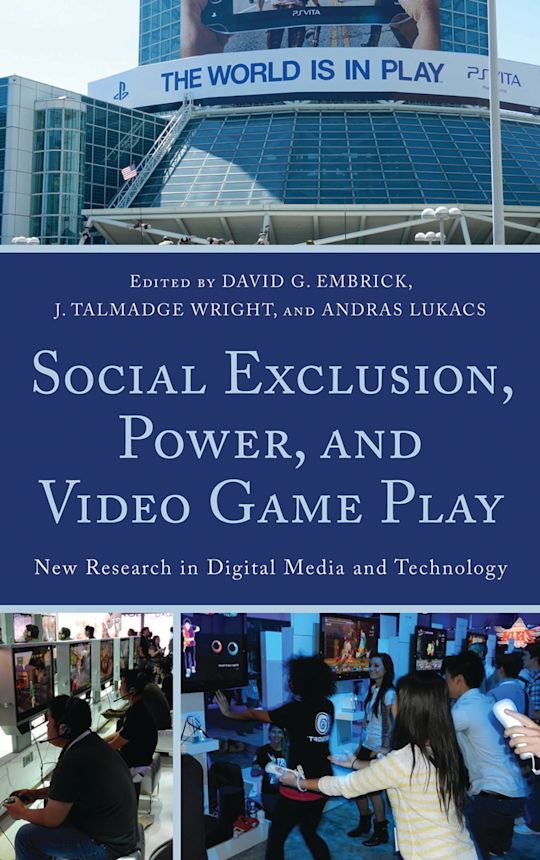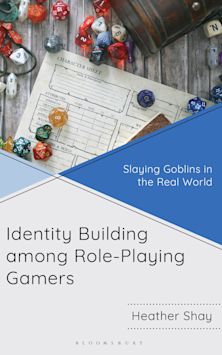Social Exclusion, Power, and Video Game Play
New Research in Digital Media and Technology
Social Exclusion, Power, and Video Game Play
New Research in Digital Media and Technology
This product is usually dispatched within 2-4 weeks
- Delivery and returns info
-
Flat rate of $10.00 for shipping anywhere in Australia
Description
While many books and articles are emerging on the new area of game studies and the application of computer games to learning, therapeutic, military, and entertainment environments, few have attempted to contextualize the importance of virtual play within a broader social, cultural, and political environment that raises the question of the significance of work, play, power, and inequalities in the modern world. Studies tend to concentrate on the content of virtual games, but few have questioned how power is produced or reproduced by publishers, gamers, or even social media; how social exclusion (based on race, class, or gender) in the virtual environment is reproduced from the real world; and how actors are able to use new media to transcend their fears, anxieties, prejudices, and assumptions. The articles presented by the contributors in this volume represent cutting-edge research in the area of critical game play with the hope of drawing attention to the need for more studies that are both sociological and critical.
Table of Contents
Chapter 1: Introduction to Social Exclusion, Power and Video Game Play
David G. Embrick, J. Talmadge Wright and Andras Lukacs
Part II. Social-Psychological Implications of Virtual Play
Chapter 2: Marking the Territory: Grand Theft Auto IV as a Playground for Masculinities
Elena Bertozzi
Chapter 3: Discursive Engagements in World of Warcraft: A Semiotic Analysis of Player Relationships
Elizabeth ErkenBrack
Chapter 4: The Intermediate Ego – The Location of the Mind at Play
Vanessa Long
Chapter 5: Producing the Social in Virtual Realms
J. Talmadge Wright
Part III. Social Inequalities in Video Game Spaces: Race, Gender, and Virtual Play
Chapter 6: Racism in Gaming: Connecting Extremist and Mainstream Expressions of White Supremacy
Jessie Daniels and Nick LaLone
Chapter 7: Worlds of Whiteness: Race and Character Creation in Online Games
David Dietrich
Chapter 8: Gendered Pleasures: The Wii, Embodiment and Technological Desire
Adrienne Massanari
Chapter 9: Sincere Fictions of Whiteness in Virtual Worlds: How Fantasy Massively Multiplayer Online Games Perpetuate Colorblind, White Supremacist Ideology
Joel Ritsema and Bhoomi Thakore
Chapter 10: The Goddess Paradox: Hyper-resonance Shaping Gender Experiences in MMORPGs
Zek Cypress Valkyrie
Part IV. Game Fans Speak Out
Chapter 11: To Play is to Design: An Analysis of Player/Designer Interactions in World of Warcraft
Sean C. Duncan
Chapter 12: Western Otaku: Games Crossing Cultures
Mia Consalvo
Chapter 13: Beyond the Virtual Realm: Fallout fans, Producers, and the Troublesome Issue of Ownership in Videogame Fandom
R.M. Milner
Part V. Summary and Conclusions
Chapter 14: Conclusion
Andras Lukacs, David G. Embrick, and J. Talmadge Wright
Product details
| Published | 01 Mar 2012 |
|---|---|
| Format | Hardback |
| Edition | 1st |
| Extent | 282 |
| ISBN | 9780739138601 |
| Imprint | Lexington Books |
| Dimensions | 232 x 158 mm |
| Publisher | Bloomsbury Publishing |



































